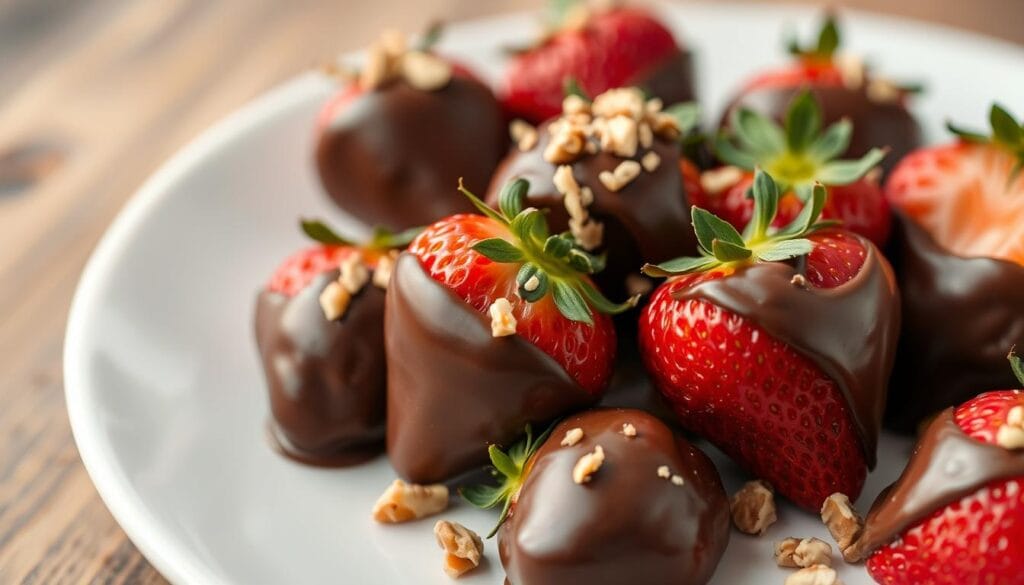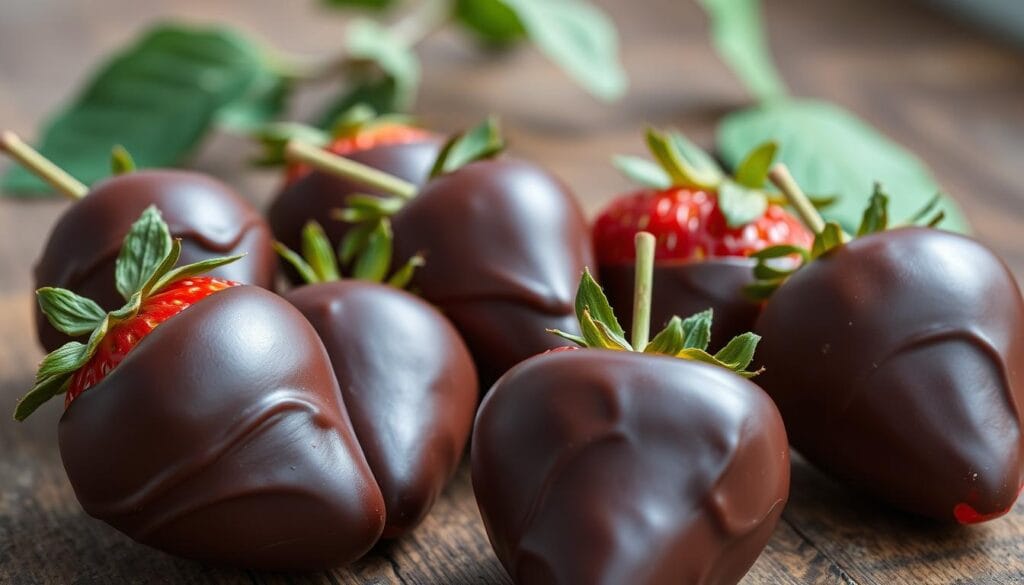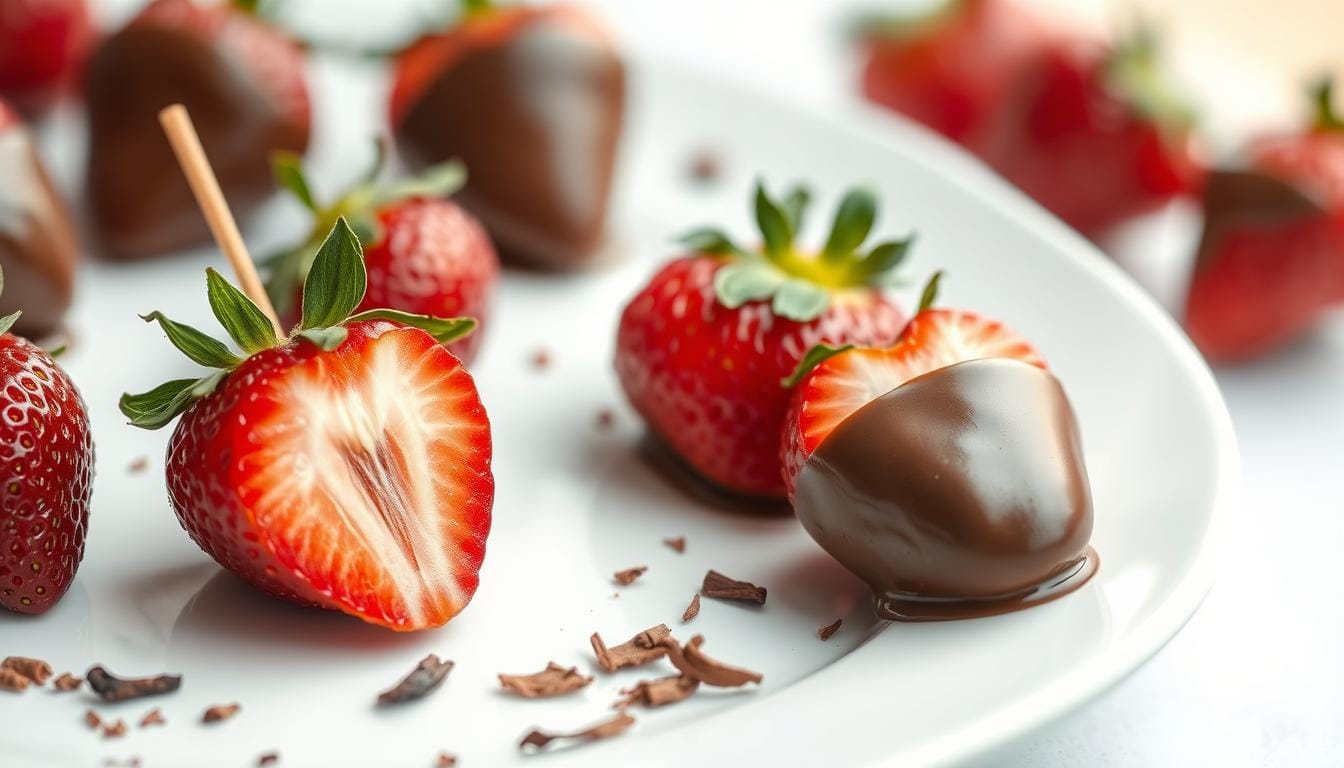As the warm sun touches my face, I think back to summer afternoons. I’d arrange strawberries on a plate, my hands covered in melted carob. It was a cherished ritual, a moment of pure joy and connection with nature. Today, I’m excited to share this beloved recipe with you, a guilt-free treat that combines carob’s natural sweetness with the vibrant essence of strawberries.
Carob covered strawberries are a healthier choice than traditional chocolate-dipped treats. They let you enjoy a sweet treat without caffeine or unnecessary additives. This vegan, dairy-free, and caffeine-free dessert is not only a delight for the senses but also a nutritious snack. It’s perfect for any time of the day, whether you’re hosting a special occasion or just want a wholesome sweet treat.
Table of Contents
Understanding the Benefits of Carob as a Chocolate Alternative
Carob is a natural chocolate substitute with many health benefits. It’s caffeine-free and sweet by nature. This makes it perfect for your homemade healthy snack recipes, needing no extra sugars.
Natural Sweetness Without Caffeine
Carob powder has 229 calories per cup. It has 91.6g of carbs, 4.76g of protein, and 0.67g of fat. It’s also packed with 41g of fiber per cup.
This fiber helps slow down carb absorption. This leads to a slower rise in blood sugar, as a 2022 study found.
Nutritional Advantages of Carob
Carob is full of vitamins and minerals like vitamin E, D, C, niacin, and folate. It also has all seven essential amino acids, meeting WHO standards. This makes carob a rich fruit and carob option for dairy-free indulgence.
Allergen-Friendly Properties
Carob is great because it’s allergen-friendly. It’s free from cocoa, perfect for those allergic to chocolate. This opens up many healthy snack options for those with dietary restrictions.
Carob’s versatility, natural sweetness, and nutritional value make it ideal for tasty dairy-free indulgence treats. Try carob-covered strawberries for a classic fruit and carob delight.
Essential Ingredients and Kitchen Tools
To make tasty carob-coated strawberries at home, you need a few things. You’ll need fresh, ripe strawberries and good carob chips. You can also add coconut oil or nut butter for creaminess.
You’ll need a double boiler or a microwave-safe bowl to melt the carob chips. A candy thermometer helps get the carob coating right. And, you’ll need airtight containers to store the strawberries.
This recipe is easy to change for different diets. You can use vegan carob flakes and different nut or seed butters. With the right stuff, you can make a yummy, allergy-friendly dessert for everyone.
Getting the carob coating to look good is all about controlling the temperature and dipping right. We’ll show you how in the next parts. With these tips, you’ll make carob-covered strawberries that look and taste amazing.
Selecting and Preparing Fresh Strawberries
Choosing the right strawberries is key to making tasty carob-covered strawberries at home. Look for plump, firm strawberries with a bright red color and fresh green tops. Stay away from shriveled or damaged berries to keep your treat looking and tasting great.
Choosing the Perfect Berries
Strawberries should be ripe but not too ripe. They should feel firm and have a shiny, unblemished skin. Check each berry for bruises, mold, or color changes. This ensures your carob coating sticks well and looks good.
Proper Washing and Drying Techniques
- Gently wash the strawberries under cool, running water, avoiding any prolonged soaking.
- Pat the berries dry thoroughly with paper towels or a clean, lint-free cloth.
- Ensure the strawberries are completely dry before dipping them in the carob coating to prevent any interference with the smooth, even coverage.
Temperature Considerations
Temperature is important for carob-covered strawberries. Use strawberries at room temperature for the best results. This ensures the carob coats evenly and looks professional. Cold or warm berries can mess up the carob’s texture.
| Nutrition Facts | Per Serving |
|---|---|
| Calories | 103 kcal |
| Carbohydrates | 13g |
| Protein | 2g |
| Fat | 5g |
| Saturated Fat | 3g |
| Cholesterol | 3mg |
| Sodium | 23mg |
| Potassium | 215mg |
| Fiber | 2g |
| Sugar | 9g |
| Vitamin A | 1289IU |
| Vitamin C | 10mg |
| Calcium | 104mg |
| Iron | 2mg |
By following these tips, you’ll make a stunning and tasty fruit and carob treat. It’s a healthy snack option too.
Carob Covered Strawberries Recipe
Try this vegan sweet treat for a delightful experience. The carob covered strawberries recipe uses carob, a natural chocolate substitute. It’s sweet but has no caffeine, making it a healthier option.
First, pick fresh, ripe strawberries and quality carob chips. It’s important to melt the carob at the right temperature. Use a double boiler or the microwave to melt it, aiming for 95-105°F.
- Rinse and dry your strawberries well to remove moisture.
- In a double boiler or heatproof bowl, melt the carob chips, stirring constantly until smooth.
- Or, melt the carob in the microwave in 30-second intervals, stirring between each.
- Add a bit of coconut oil or nut butter for a creamier texture.
- Dip the strawberries in the melted carob, coating them well.
- For a thicker coat, do a “double dip.”
- Shake off excess carob and put the strawberries on a parchment-lined baking sheet.
- Add healthy garnishes like chopped nuts, seeds, or superfoods on top.
These carob covered strawberries are a sweet and healthy treat. They’re perfect for satisfying your sweet tooth without harming your health. Enjoy the natural sweetness of carob and fresh strawberries in every bite.
Melting Carob: Double Boiler vs. Microwave Method
When making carob covered strawberries, melting the carob is key. You can use a double boiler or the microwave. Each method has its own benefits, depending on what you prefer and what you have in your kitchen.
Temperature Control Tips
It’s important to control the temperature when melting carob. The best temperature is between 95°F and 105°F. This keeps the carob smooth and prevents it from burning.
Achieving the Perfect Consistency
The melted carob should be smooth for an even coat. If it’s too thick, add a bit of coconut or vegetable oil. Start with 1 tablespoon for every half cup of carob chips. This keeps the right consistency for dipping.
| Double Boiler Method | Microwave Method |
|---|---|
|
|
Whether you use a double boiler or the microwave, watch the temperature and consistency closely. This ensures a smooth, chocolate-free coat for your tasty carob coating strawberries.
Dipping Techniques for Professional Results
Getting the perfect carob coating on your homemade carob covered strawberries is all about the dipping technique. Follow these steps to make your dairy-free indulgence look great and taste amazing.
- Hold the strawberries by the stem and gently dip them into the melted carob, rotating them slowly for even coverage.
- Allow any excess carob to drip back into the bowl before placing the dipped strawberries on a cooling rack or parchment-lined baking sheet.
- For a thicker, more indulgent coating, use the “double dip” method: Dip the strawberry once, let it set for a minute, then dip it again.
- Work quickly and gently to achieve the best results, maintaining the carob temperature between 100-110°F for optimal dipping consistency.
| Dipping Technique | Benefits |
|---|---|
| Single Dip | Lighter, more delicate coating |
| Double Dip | Thicker, more indulgent coating |
Remember to handle the strawberries with care to avoid bruising or damaging the delicate fruit. By following these simple dipping techniques, you’ll create carob covered strawberries that look and taste like they were made by a professional.

“The key to perfectly coated carob covered strawberries is in the dipping technique. With a little practice, you’ll be creating restaurant-worthy treats in no time.”
Creative Toppings and Decorative Elements
Make your vegan sweet treat and healthy snack even better with some creativity! Add a special touch to your carob covered strawberries. Try out different toppings and decorations.
Healthy Garnish Options
Top your strawberries with chopped nuts like almonds, walnuts, or pecans for a nice crunch. Add goji berries, chia seeds, or shredded coconut for extra nutrition. For a rich taste, drizzle melted cacao nibs on top.
Presentation Tips
Put your strawberries on a fancy platter or in cups for a great look. Get creative with shapes and patterns to wow your guests. Add a sprig of fresh mint or a dusting of cocoa powder for a finishing touch.
| Topping | Flavor Profile | Nutrition Benefits |
|---|---|---|
| Chopped Nuts (Almonds, Walnuts, Pecans) | Crunchy, Nutty | High in Healthy Fats, Protein, and Fiber |
| Goji Berries | Sweet, Tangy | Rich in Antioxidants, Vitamins, and Minerals |
| Chia Seeds | Neutral, Crunchy | High in Omega-3s, Fiber, and Protein |
| Shredded Coconut | Sweet, Tropical | Contains Healthy Fats and Fiber |
| Melted Cacao Nibs | Intense Chocolate Flavor | High in Antioxidants and Minerals |
With these creative toppings and decorations, your carob covered strawberries become a stunning vegan sweet treat and healthy snack. Your family and friends will love it.
Storage and Shelf Life
Proper storage is key to keeping your homemade carob covered strawberries recipe fresh. Here are some easy tips to follow:
Put the carob covered strawberries in an airtight container. Line it with parchment paper or silicone mats. This keeps the berries from sticking and keeps their texture soft. Store it in a cool, dry spot, away from sunlight or heat to prevent the carob from melting or changing color.
Eat the carob covered strawberries within 1-2 days for the best taste. Refrigeration can help them last longer, but it’s not the best choice. The cold can mess with the carob and strawberry texture. Freezing is also a no-go, as it can ruin the carob and strawberries.
| Storage Method | Recommended Shelf Life |
|---|---|
| Room temperature, airtight container | 1-2 days |
| Refrigerated | 3-5 days |
| Frozen | Not recommended |
By storing your carob covered strawberries recipe right, you’ll enjoy it longer. Your homemade, chocolate-free dessert will stay fresh and tasty!

Troubleshooting Common Issues
Making perfect carob-coated strawberries at home is fun, but you might face some issues. Don’t worry, we’ve got easy fixes to help your allergy-friendly dessert look great every time.
Texture Problems
If the carob coating is too thick, add a bit of coconut or vegetable oil. Mix it gently until it’s right. If it’s grainy, warm the carob a bit and stir well to make it smooth.
Setting Difficulties
Getting the carob coating to set right is key. Make sure your strawberries are dry before coating. Also, keep the carob mix at the right temperature to avoid it getting too hard.
If the carob doesn’t set, chill the strawberries in the fridge for 10-15 minutes. A bit of patience and care will help you make delicious, allergy-friendly treats that everyone will love.
“Carob has been traditionally used in medicine for treating diarrhoea, diabetes, and hypertension, offering various health-promoting properties.”
Conclusion
Carob covered strawberries are a tasty, healthier choice instead of chocolate-covered strawberries. This simple carob covered strawberries recipe is vegan, dairy-free, and caffeine-free. It’s perfect for many diets. You can make a stunning and healthy healthy snack or vegan sweet treat with the right techniques.
This treat is great for any time because of its natural sweetness and health perks. Carob is a great chocolate alternative that doesn’t have caffeine or theobromine. It also has fiber, antioxidants, calcium, and more, making it a better choice than regular chocolate.
If you want something sweet or a healthier snack, carob covered strawberries are a wonderful pick. Try different toppings and decorations to make each batch special. Enjoy the natural sweetness and health benefits for a treat that’s guilt-free.

